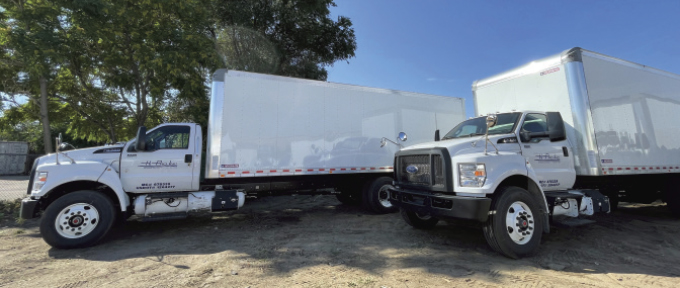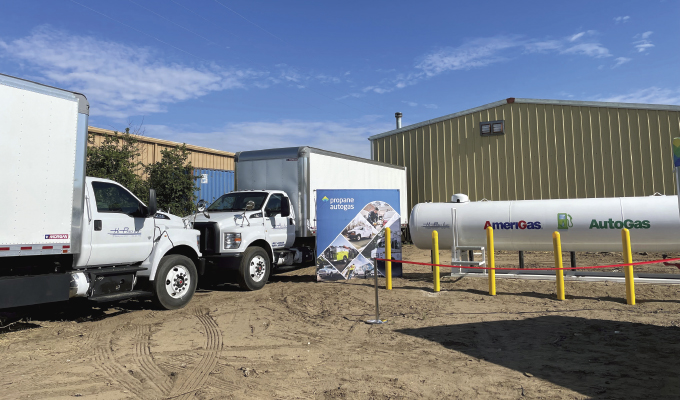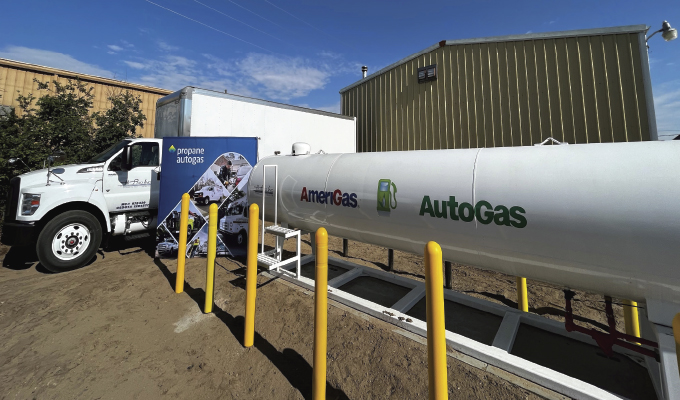Hi Pro, Inc., a postal service contractor in the Denver metro area, is now providing cleaner mail delivery to the communities it serves with new propane vehicles. When Hi Pro received its first five Ford F-750 trucks in 2022, the community celebrated with a ribbon cutting ceremony to unveil the new trucks and zero-cost fueling infrastructure. The company has had so much success with the clean fuel initiative that it is now working to completely move its entire contract from diesel to propane and will acquire an additional four trucks this year.
IMMEDIATE RESULTS
With the first wave of propane trucks, Hi Pro will reduce its CO2 emissions by 20% and reduce fuel costs by a whopping 50%.
“We’ve all felt the pain of filling up at the pump with gasoline or diesel,” says Joshua Stoneback, Hi Pro, Inc. CEO. “With propane, I won’t feel that anymore. The cost of propane autogas is a fraction of what I would be paying for diesel. And to top it off, the fleet is reducing emissions at the same time. It’s a win-win for everyone.”
Propane autogas, the term used for propane when used in an on-road engine, offers both economic and environmental benefits. As a domestically produced resource, propane is affordable, abundant, reliable, and offers an immediate emissions reduction solution for fleets looking to meet federal emissions standards.
Propane autogas vehicles—like Hi Pro’s new trucks—are proven to reduce greenhouse gases and NOx emissions to near-zero levels. According to Drive Clean Colorado, a Clean Cities coalition, the company’s propane trucks have a comparable lifetime low-carbon footprint to electric vehicles but achieve results at a fraction of the price over the life of the truck. Each truck will produce 281 metric tons of CO2 less per year than the same EV trucks, which would rely on Colorado’s electric grid for charging and operating needs.
Propane autogas makes sense for the fleets servicing the postal market because the emissions-reducing, cost-cutting fuel technology is available to them today.
“Propane autogas is a viable solution to provide contractors with the low-emissions energy they need to best service their communities right now,” says Jennifer Beiro-Réveillé of USPS at last year’s ribbon cutting ceremony.

EASY TO ORDER
After hearing about the benefits of propane autogas during meetings with the National Star Route Mail Contractors Association and the Propane Education & Research Council, Stoneback began to consider launching a cleaner initiative for the company’s fleet. And he learned that ordering propane vehicles is as easy as ordering diesel or gasoline. The propane engines are built by ROUSH CleanTech, a trusted OEM propane fuel system provider for Ford Motor Company. That means customers like Hi Pro can order their chassis at their Ford dealer like they would for gasoline or diesel vehicles.
EASY TO OPERATE
Operating propane vehicles offers a reliable option that does not impact daily operation because Hi Pro can count on the trucks being on the road in any weather. Propane vehicles have no cold start issues and have a range of up to 400 miles on a single refuel. Stoneback is especially excited that the propane vehicles will be a cleaner option for rural operators. The trucks, which travel 400,000 miles per year, will be used for bulk delivery in Denver, up in the mountains to the west, and to the plains to the east.
While Hi Pro still operates part of its fleet on other conventional fuels including diesel, they’ve seen dramatic savings with propane—both on fuel and on infrastructure. Hi Pro’s current per gallon rate for diesel is $3.69; for propane, it’s $2.03.
For fueling, Hi Pro worked with AmeriGas to install propane infrastructure at zero cost with a fuel contract. Propane offers the most flexible and cost-effective fueling infrastructure of any fuel—conventional or alternative. Fueling options include: on-site infrastructure, mobile fuel delivery, or public fueling stations. Many businesses install an on-site fueling station because it’s cost-effective and easy to maintain. Propane’s availability is steady, allowing customers like Hi Pro to lock in pricing and create more security for their budgets even when markets fluctuate.

TIPS FROM THE FIELD
When asked to share top tips for fleet managers considering adopting propane as a clean alternative fuel, Stoneback recommends analyzing several factors.
“Compare the numbers as if you are going to pay 40% less on fuel, remove all the maintenance costs per mile of DPF filters and related breakdowns and derates, and remove DEF costs,” Stoneback says. “There is less time, money, and labor for fueling if the fueling station is on your site. Then compare your total cost of operation per mile over the life of the vehicle on propane versus diesel.”
RELIABLE & SUSTAINABLE
Greg Reed, executive director for the National Star Route Mail Contractors Association believes that propane autogas is a reliable domestic source of energy and a great option for parcel delivery.
“If there is anything that should move with a reliable, domestic source of energy, it is the mail,” Reed says. “The postal service is embracing this technology and urging more contractors to use it.”
Stoneback says that Hi Pro strives to embody a culture of serving others and that the company sees a future in which clients demand environmentally conscious decisions and outcomes.
“We wish to serve those customers with a commitment to clean energy,” Stoneback says.
ABOUT THE AUTHOR
Todd Mouw is executive vice president of sales and marketing for ROUSH CleanTech, an industry leader of alternative fuel vehicle technology. Mouw has served as president of the NTEA Green Truck Association. Find out more, visit www.roushcleantech.com.




